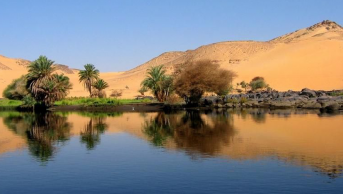Towards a New Stage in Water Management in Cyprus: Impact of Turkey’s Water Transfer to TRNC as a Facilitative Factor

The final stage concerning the negotiations between the Republic of Turkey and Turkish Republic of Northern Cyprus (TRNC) on the management of water that reached island recently, occurred in the early days of December last year during the visit of Prime Minister Davutoğlu to Cyprus. After this visit, different sources in media reported that parties had reached an agreement on the management of water. Although these reporting have not yet been confirmed, the discussions show that Turkey’s water transfer to TRNC already started to contribute to the anchoring of water management in Northern Cyprus into a reasonable and integrated foundation. This situation, namely restructuring of water management in Cyprus is -at least- as important as transfer of the water itself.
Prime Minister Davutoğlu has underlined during his visit that the benefit of water is not only confined to the contribution to the water budget in the island: “Because this is not an ordinary economic project for us, it is a significant project of message with its deep strategic and psychological dimensions, to reconnect Anatolia and the island of Cyprus. It is also a significant project in terms of peace. Because, we, starting from the very first day, have put forward that the water to be transferred will not only be brought to Turkish Cypriots, but also to Greek Cypriots, in time; and this is a project of peace." This approach is significant in the sense that it shows Davutoğlu government's intention to construct water as an element for a comprehensive peace. This understanding, within the context of international relations, symbolizes not only the contribution solely to the problem in Cyprus, but also in a wider geography, the process of relaxation of recently strained relations in the Eastern Mediterranean, towards a more prudent and peace oriented atmosphere. Establishment of a water-based peace dialogue in Cyprus can become the first wave of a rapprochement, effects of which may go beyond the borders of the island. Such a dialogue, if successful, can trigger a considerable increase of agricultural output in the island and export of the surplus to the countries in the region. As a result, Cyprus can become a key area with a capability of feeding the Eastern Mediterranean basin.
In order to pass the main hurdle against this target for Cyprus, which has appropriate climatic and topographical features, as well as proximity to important centers in the Eastern Mediterranean basin, a comprehensive and equitable peace should be established in the island. This ultimate aim, while it needs serious sacrifices and consensus; is also ambitious and very desirable particularly concerning the anticipated impacts.
The starting point for such a comprehensive plan of integration would be the creation of a planning mechanism which could promote effective water use in Northern Cyprus at first. It should be borne in mind that the benefit from existing water is basically dependent upon the user’s approach. You may wash your car with 300 liters of water just for once, but on the other hand, you may use this as a source of drinking water for your whole family for a month. The critical balance concerning the benefit versus amount of water to be used gets even more important in water scarce environments. On this subject, the main area where the world’s entire scientific community focuses is around the question of how we can benefit more from less amount of water.
Following remarks by Prime Minister clarifies that the transfer of water only partly achieved the targeted benefit, while the main issue remains to be establishment o a system of management that would guarantee efficient water use: “It is important to manage the transferred water in the best way and to provide it to our Cypriot kin in the best form. This model of management is equally important as the transfer of water. Because we also know from the experiences that we have witnessed in Turkey; presence of water is something different, but if a sound methodology for management of water is not developed… There were water rationings in Istanbul, despite the fact that there was water. This is why we are working on a model.” This model that Davutoğlu mentions, if it succeeds, would not only deal with the water being transferred from Turkey, but also would envisage a sound model for the management and use of the problematic groundwater in Cyprus around contemporary water management principles. Such a model also complies with the Water Framework Directive, the main legal and political frame of the European Union on water issues. Therefore, it also means that Northern Cyprus would be able to pass a criterion that it needs to pass on the way towards becoming a member to the EU. This is because Member States are obliged to implement the acquis, and water is a notable and costly part of this acquis.
More concrete statements and some details have recently become clearer on how such a model could be formed. According to these, a new consortium will be responsible from the management of the water that is being transferred to the island. This consortium will include companies from Northern Cyprus, as well. This model of management seems to be a wise and a ‘via media’ approach. With the aforementioned approach while costs of water would be paid by users and polluters, stakeholders from northern Cyprus would have a say, in accordance with the principles of participation and subsidiarity. If this model -which supports efficient water use in the most possible manner - can be realized in full, it may trigger a good progress in rising sectors of northern Cyprus, namely agriculture, tourism and higher education. Undoubtedly, improvements in economic data of Northern Cyprus will also facilitate efforts for resolution of Cyprus issue. It is not necessary to mention that a prospering Northern Cyprus, which will become a center of attraction, will have stronger say in negotiations towards unification. To conclude, Cyprus can transform into a central actor in the Middle East after a process during which benefits from water are synergistically harvested and political wills for integration are mobilized.
This article was published in Ortadoğu Analiz journal with the title of "Towards a New Stage in Water Management in Cyprus: Impact of Turkey’s Water Transfer to TRNC as a Facilitative Factor”






